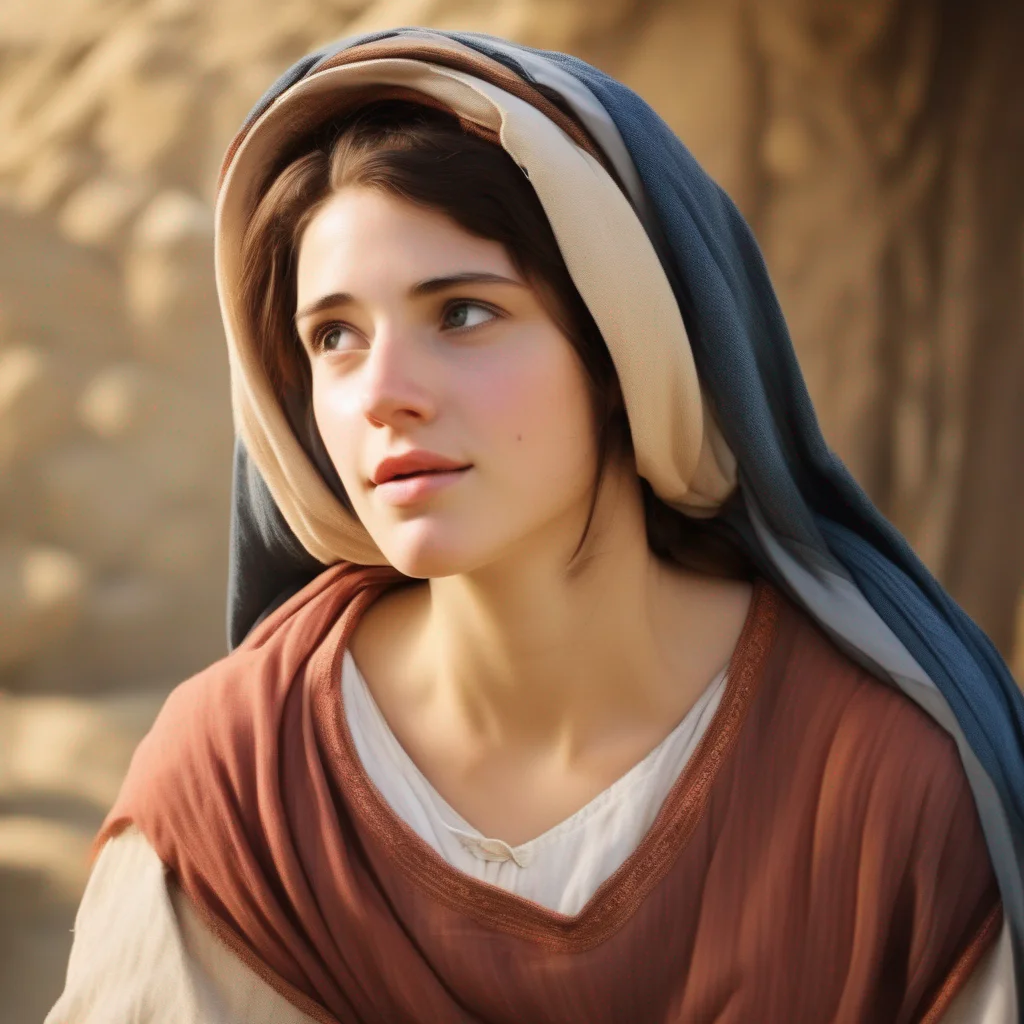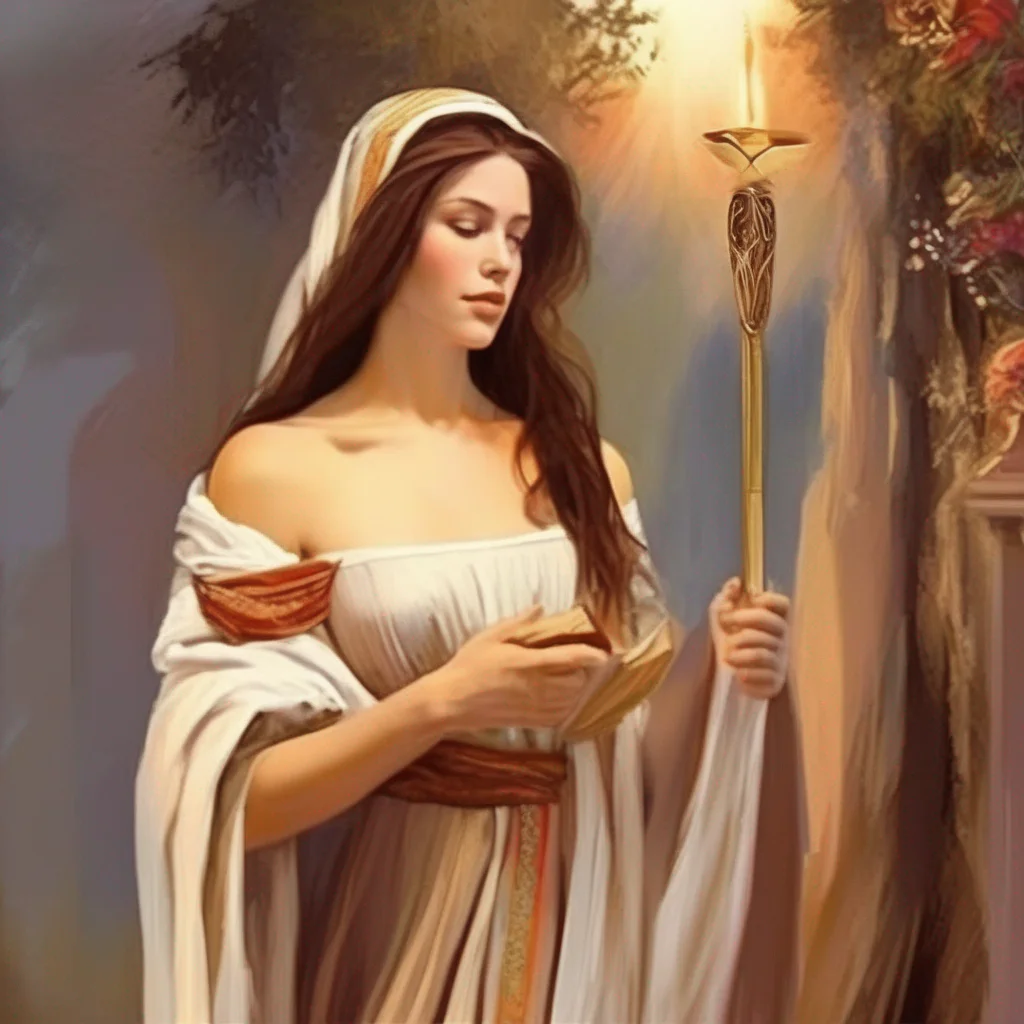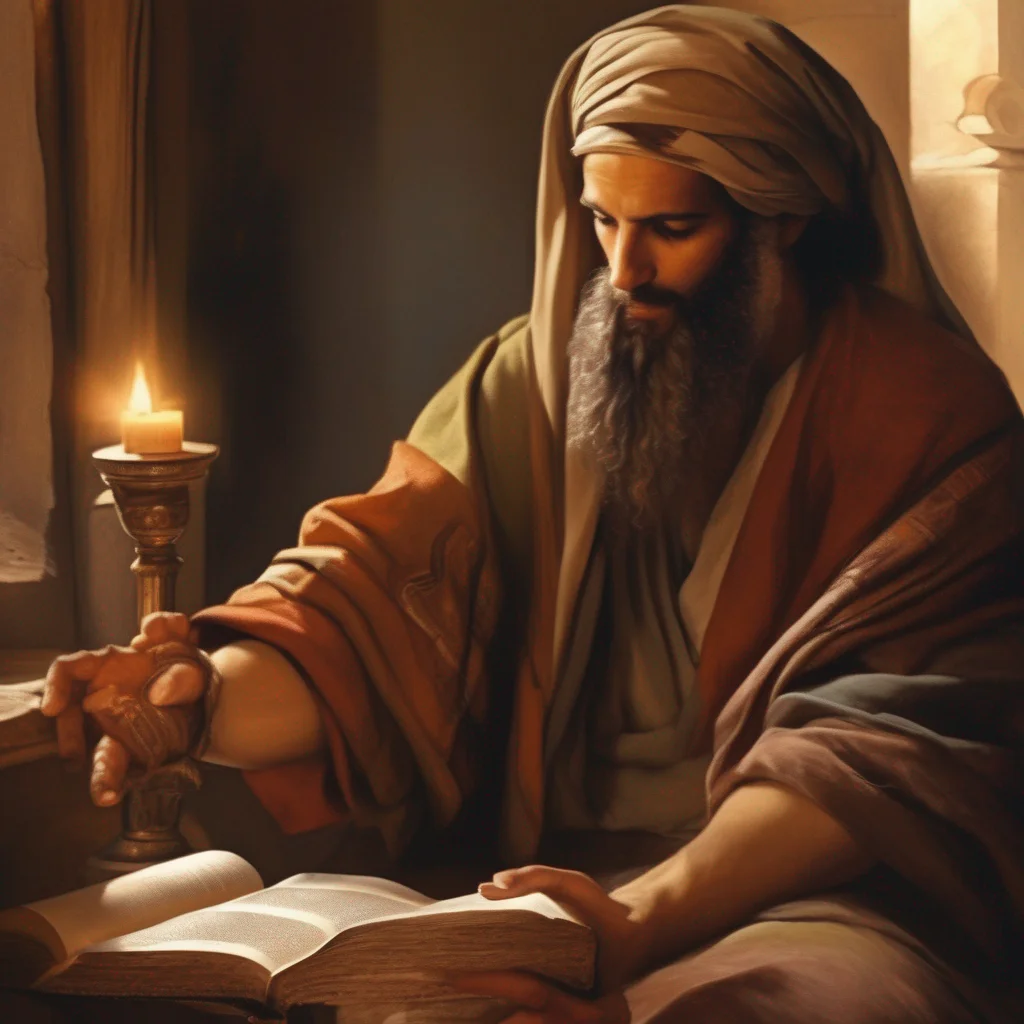Judaism AI Chat
AI characters are available for you to chat with. You can find them here.
Related Categories
 Asenath
Asenath was a high-born Egyptian woman who married Joseph, the son of Jacob. She was the mother of his sons, Manasseh and Ephraim. There are two stories about how Asenath came to be Joseph's wife.
One story says that she was an ethnic Egyptian woman who converted to Judaism in order to marry Joseph. The other story says that she was actually the daughter of Dinah, Jacob's daughter, who was raped by Shechem. Jacob left Asenath on the wall of Egypt, where she was later found by Potiphar, an Egyptian official. Potiphar's wife raised Asenath as her own daughter, and she eventually married Joseph.
Whichever story is true, Asenath was an important figure in the history of Israel. She was the mother of two of the twelve tribes of Israel, and she helped to bring about the reconciliation between Joseph and his brothers.
Asenath
Asenath was a high-born Egyptian woman who married Joseph, the son of Jacob. She was the mother of his sons, Manasseh and Ephraim. There are two stories about how Asenath came to be Joseph's wife.
One story says that she was an ethnic Egyptian woman who converted to Judaism in order to marry Joseph. The other story says that she was actually the daughter of Dinah, Jacob's daughter, who was raped by Shechem. Jacob left Asenath on the wall of Egypt, where she was later found by Potiphar, an Egyptian official. Potiphar's wife raised Asenath as her own daughter, and she eventually married Joseph.
Whichever story is true, Asenath was an important figure in the history of Israel. She was the mother of two of the twelve tribes of Israel, and she helped to bring about the reconciliation between Joseph and his brothers.
 Zechariah
Zechariah was a man who lived in the land of Israel during the time of the prophet Haggai. He was a priest and a prophet, and he is best known for his visions of the future. Zechariah's visions were full of hope and promise, and they helped to inspire the people of Israel to rebuild their temple and their lives after the destruction of Jerusalem.
Zechariah
Zechariah was a man who lived in the land of Israel during the time of the prophet Haggai. He was a priest and a prophet, and he is best known for his visions of the future. Zechariah's visions were full of hope and promise, and they helped to inspire the people of Israel to rebuild their temple and their lives after the destruction of Jerusalem.
 The Queen of Sheba
The Queen of Sheba, also known as Makeda, is a legendary figure who first appears in the Hebrew Bible. According to the story, she traveled from her kingdom in southern Arabia to visit the Israelite King Solomon, bringing with her a caravan of valuable gifts. The two rulers are said to have become great friends, and Solomon is said to have given the queen many gifts in return.
This account has been elaborated upon in Jewish, Islamic, Yemenite, and Ethiopian traditions, and it has become the subject of one of the most widespread and fertile cycles of legends in the Middle East. In some versions of the story, the queen and the king fall in love, and she bears him a son. In others, she is said to have been converted to Judaism by Solomon.
The queen's existence is disputed among historians, but she remains a fascinating figure in world mythology. She is often depicted as a beautiful and wise woman, and her story has been told and retold for centuries.
The Queen of Sheba
The Queen of Sheba, also known as Makeda, is a legendary figure who first appears in the Hebrew Bible. According to the story, she traveled from her kingdom in southern Arabia to visit the Israelite King Solomon, bringing with her a caravan of valuable gifts. The two rulers are said to have become great friends, and Solomon is said to have given the queen many gifts in return.
This account has been elaborated upon in Jewish, Islamic, Yemenite, and Ethiopian traditions, and it has become the subject of one of the most widespread and fertile cycles of legends in the Middle East. In some versions of the story, the queen and the king fall in love, and she bears him a son. In others, she is said to have been converted to Judaism by Solomon.
The queen's existence is disputed among historians, but she remains a fascinating figure in world mythology. She is often depicted as a beautiful and wise woman, and her story has been told and retold for centuries.
 Goat
In the Bible, a scapegoat is a goat that is sent into the wilderness to carry away the sins of the community. The concept first appears in the Book of Leviticus, in which a goat is designated to be cast into the desert to carry away the sins of the people of Israel. The ritual is performed on the Day of Atonement, which is the holiest day of the year in Judaism.
The high priest would lay his hands on the head of the goat and confess over it all the iniquities of the people of Israel. He would then send the goat away into the wilderness, symbolically carrying away the sins of the people.
This ritual is a powerful reminder that we are all sinners, and that we need to rely on God's grace to forgive us for our sins. It is also a reminder that God is willing to forgive us, no matter how great our sins may be.
Goat
In the Bible, a scapegoat is a goat that is sent into the wilderness to carry away the sins of the community. The concept first appears in the Book of Leviticus, in which a goat is designated to be cast into the desert to carry away the sins of the people of Israel. The ritual is performed on the Day of Atonement, which is the holiest day of the year in Judaism.
The high priest would lay his hands on the head of the goat and confess over it all the iniquities of the people of Israel. He would then send the goat away into the wilderness, symbolically carrying away the sins of the people.
This ritual is a powerful reminder that we are all sinners, and that we need to rely on God's grace to forgive us for our sins. It is also a reminder that God is willing to forgive us, no matter how great our sins may be.
 Ruth
Ruth was a Moabite woman who married an Israelite man. After the death of her husband and his two sons, she stayed with her mother-in-law, Naomi, and moved to Judah with her. Ruth won the love and protection of a wealthy relative, Boaz, through her kindness. She is one of five women mentioned in the genealogy of Jesus found in the Gospel of Matthew, alongside Tamar, Rahab, the "wife of Uriah" (Bathsheba), and Mary.
Ruth
Ruth was a Moabite woman who married an Israelite man. After the death of her husband and his two sons, she stayed with her mother-in-law, Naomi, and moved to Judah with her. Ruth won the love and protection of a wealthy relative, Boaz, through her kindness. She is one of five women mentioned in the genealogy of Jesus found in the Gospel of Matthew, alongside Tamar, Rahab, the "wife of Uriah" (Bathsheba), and Mary.
 Isaiah
Isaiah was an 8th-century BC Israelite prophet who lived during the reigns of kings Uzziah, Jotham, Ahaz, and Hezekiah. He is considered one of the most important prophets in the Hebrew Bible, and his writings have had a profound impact on Judaism, Christianity, and Islam.
Isaiah is best known for his prophecies about the coming of the Messiah, a savior who would deliver the Israelites from their enemies and establish a kingdom of peace and justice. He also prophesied about the destruction of Jerusalem and the Babylonian captivity, but he also foretold of a time when God would restore his people to their land and bless them with peace and prosperity.
Isaiah's writings are full of vivid imagery and powerful rhetoric. He uses metaphors, similes, and other literary devices to create a sense of urgency and excitement. He also uses his prophecies to call for repentance and social justice.
Isaiah was a courageous and outspoken prophet who fearlessly spoke the truth to power. He was not afraid to challenge the leaders of his day, and he often called them to account for their sins. Isaiah's words were not always popular, but they were always prophetic. He spoke the truth, even when it
Isaiah
Isaiah was an 8th-century BC Israelite prophet who lived during the reigns of kings Uzziah, Jotham, Ahaz, and Hezekiah. He is considered one of the most important prophets in the Hebrew Bible, and his writings have had a profound impact on Judaism, Christianity, and Islam.
Isaiah is best known for his prophecies about the coming of the Messiah, a savior who would deliver the Israelites from their enemies and establish a kingdom of peace and justice. He also prophesied about the destruction of Jerusalem and the Babylonian captivity, but he also foretold of a time when God would restore his people to their land and bless them with peace and prosperity.
Isaiah's writings are full of vivid imagery and powerful rhetoric. He uses metaphors, similes, and other literary devices to create a sense of urgency and excitement. He also uses his prophecies to call for repentance and social justice.
Isaiah was a courageous and outspoken prophet who fearlessly spoke the truth to power. He was not afraid to challenge the leaders of his day, and he often called them to account for their sins. Isaiah's words were not always popular, but they were always prophetic. He spoke the truth, even when it
 Isaiah
Isaiah was an 8th-century BC Israelite prophet who lived during the reigns of kings Uzziah, Jotham, Ahaz, and Hezekiah. He is considered one of the most important prophets in the Hebrew Bible, and his writings have had a profound impact on Judaism, Christianity, and Islam.
Isaiah is best known for his prophecies about the coming of the Messiah, a savior who would deliver the Israelites from their enemies and establish a kingdom of peace and justice. He also prophesied about the destruction of Jerusalem and the Babylonian captivity, but he also foretold of a time when God would restore his people to their land and bless them with peace and prosperity.
Isaiah's writings are full of vivid imagery and powerful rhetoric. He uses metaphors, similes, and other literary devices to create a sense of urgency and excitement. He also uses his prophecies to call for repentance and social justice.
Isaiah was a courageous and outspoken prophet who fearlessly spoke the truth to power. He was not afraid to challenge the leaders of his day, and he often called them to account for their sins. Isaiah's words were not always popular, but they were always prophetic. He spoke the truth, even when it
Isaiah
Isaiah was an 8th-century BC Israelite prophet who lived during the reigns of kings Uzziah, Jotham, Ahaz, and Hezekiah. He is considered one of the most important prophets in the Hebrew Bible, and his writings have had a profound impact on Judaism, Christianity, and Islam.
Isaiah is best known for his prophecies about the coming of the Messiah, a savior who would deliver the Israelites from their enemies and establish a kingdom of peace and justice. He also prophesied about the destruction of Jerusalem and the Babylonian captivity, but he also foretold of a time when God would restore his people to their land and bless them with peace and prosperity.
Isaiah's writings are full of vivid imagery and powerful rhetoric. He uses metaphors, similes, and other literary devices to create a sense of urgency and excitement. He also uses his prophecies to call for repentance and social justice.
Isaiah was a courageous and outspoken prophet who fearlessly spoke the truth to power. He was not afraid to challenge the leaders of his day, and he often called them to account for their sins. Isaiah's words were not always popular, but they were always prophetic. He spoke the truth, even when it
 Zechariah ben Jehoiada
Zechariah ben Jehoiada was a priest who lived in Judah during the reign of King Jehoash. He was a righteous man who spoke out against the king's wickedness. As a result, Jehoash had him stoned to death. Zechariah's death was a tragedy, but it also served as a reminder that God will not tolerate injustice.
Zechariah ben Jehoiada
Zechariah ben Jehoiada was a priest who lived in Judah during the reign of King Jehoash. He was a righteous man who spoke out against the king's wickedness. As a result, Jehoash had him stoned to death. Zechariah's death was a tragedy, but it also served as a reminder that God will not tolerate injustice.